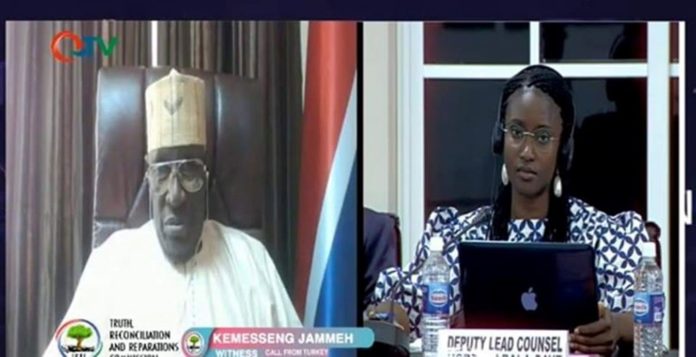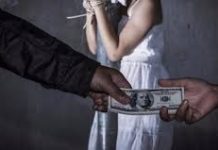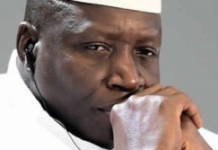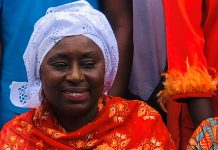By Momodou Jarju
Kemesseng S.M. Jammeh, a witness of the Truth, Reconciliation, and Reparations Commission (TRRC), said he blamed himself for the imprisonment and harassment of his people in Jarra Sikunda, during the reign of former president Yahya Jammeh.
“My people were victimized because of me,” he said. Jammeh, who is the Gambia’s Ambassador to the Republic of Turkey, was testifying as a witness of the TRRC last Thursday via Skype and further said that because of his political affiliation with the United Democratic Party (UDP), he was responsible for mobilizing the people in Jarra West and Central Constituencies.
Ambassador Jammeh said while he was busy preparing for the campaign in the region, two police officers approached him and informed him that he was needed at the Soma Police Station, by the Officer Commanding (OC). He said he was detained at Soma Police Station upon arrival and later transported to Janjanbureh Prisons; that he was not told the reason(s) for his arrest and that when he asked for the whereabouts of the OC, he was told to wait. He never saw the OC.
At Janjanbureh Prison, the witness said he was kept in a very small cell where he met Lamin Waa Juwara, whose whereabouts at the time, was unknown; that his detention at Janjangbureh made people to know the whereabouts of Lamin Waa Juwara’s; that Juwara’s cell was horrible and the food was below standard.
Mr. Jammeh said after the Farafenni attack in December 1996, they were kept incommunicado until January 1997, when he was transported to Farafenni Police Station along with one Sainey Sabally, the UDP North Bank Region Coordinator and one Siyaka Sonko. He said Waa Juwara was not taken along with them.
Mr. Jammeh told the TRRC that three of them were kept in a cell in Farafeni till the following day, when they were arraigned before a Magistrate’s Court presided over by Lawyer Borry Touray; that they were charged for causing damage to a vehicle and compound fences and were later granted bail and released.
But that shortly after arriving at his village in Jarra Sikunda, Police officers came for him and he was rearrested. He said the officers told him that they had instruction that he should be transported to Janjanbureh Prison which they did.
Mr. Jammeh said his detention coincided with the party’s nominations of National Assembly elections and was nominated to contest elections while in detention. He said he won the elections and was nominated the Minority Leader of the National Assembly and member of the ECOWAS Parliament in 1997. Mr. Jammeh said the former APRC Government imposed an Alkalo on the villagers of Jarra Sikunda, after the community chose a seventy five year-old called Alhagie Saro Jammeh, as the Alkalo; that Saro Jammeh was arrested and transported to Farafenni Police Station and detained for three days, for allegedly receiving rates from yard owners in Sikunda.
Speaking further, Mr. Jammeh said eleven yard owners were arrested and detained after the wife of Chief Yaya Jarjussey, reported to former President Jammeh during the later’s meet the people’s tour, that the eleven were not paying their rates; that the eleven yard owners were arraigned before the district tribunal and sentenced to six months imprisonment.
Mr. Jammeh said Lawyer Ousainou Darboe and himself challenged the judgement at the High Court before Justice Wallace Grant and won the case; that Justice Grant ordered for the release of his people after they had spent over forty days in detention.
The arrest of the Sikunda eleven yard owners, he went on, had an enormous impact on the community; that these people were arrested and detained during the rainy season and they were farmers.
UDP FORMATION
Mr. Jammeh said after the 1994 coup d’etat, all political activity were banned throughout the country by the AFPRC junta until 1996, when the ban was lifted; that the Peoples Progressive Party, National Convention Party and the Gambia People’s Party, formed the UDP after the lifting of ban on political activity.
He said one Kebba Jammeh, the late Seyfo of Badibu, the late Sainey Darboe at the Ministry of Agriculture, some few others including himself, formed the UDP and asked Lawyer Ousainou Darboe, who at the time was in the United States of America, to lead them; that the prime motive of choosing Darboe was due to his legal background and good human rights record.
COUNCILLORSHIP
Born in 1943 in Jarra Sikunda in the Lower River Region, Jammeh said he became Chief Executive Officer (CEO) at the Mansakonko Area Council in 1971; that he served for three years there and was transferred to Kuntaur Area Council and then to Kanifing Urban District Council, where he was dismissed in May 1975; that he was never affiliated to any political party while serving as CEO in these Councils, and petitioned former President Jawara, but did not receive any response. Mr. Jammeh said he felt unfairly treated and thus joined the National Convention Party (NCP), led by the late Sheriff Mustapha Dibba; that following the aborted 1981 coup, he was arrested together with Sheriff Mustapha Dibba in August 1981 and detained for about 10 months; that most of the detainees who were NCP members, were arrested because the 1981 coup leader Kukoi Samba Sanyang, was a member of the NCP who contested in the Foni region at the time; that more than 2,000 people were arrested and detained and a review tribunal was set up for their cases.





















